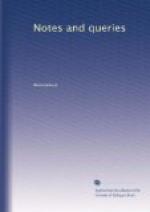[The following note from The
Book of the Court will serve
to illustrate the curious
custom referred to by our
correspondent:
“In The Privy Purse Expenses of King Henry VIII. edited by Sir Harris Nicolas, there occur several entries of payments made to the choristers of Windsor ’in rewarde for the king’s spurs’; which the editor supposes to mean ’money paid to redeem the king’s spurs, which had become the fee of the choristers at Windsor, perhaps at installations, or at the annual celebration of St. George’s feast.’ No notice of the subject occurs in Ashmole’s or Anstis’s History of the Order of the Garter. Mr. Markland, quoting a note to Gifford’s edition of Ben Jonson, vol. ii. p. 49., says, ’In the time of Ben Jonson, in consequence of the interruptions to Divine Service occasioned by the ringing of the spurs worn by persons walking and transacting business in cathedrals, and especially in St. Paul’s, a small fine was imposed on them, called “spur-money,” the exaction of which was committed to the beadles and singing-boys.’ This practice, and to which, probably, the items in Henry’s household-book bear reference, still obtains, or, at least, did till very lately, in the Chapel Royal and other choirs. Our informant himself claimed the penalty, in Westminster Abbey, from Dr. Fisher, Bishop of Rochester, and received from him an eighteenpenny bank token as the fine. He likewise claimed the penalty from the King of Hanover (then Duke of Cumberland), for entering the choir of the Abbey in his spurs. But His Royal Highness, who had been installed there, excused himself with great readiness, pleading ’his right to wear his spurs in that church, inasmuch as it was the place where they were first put on him!’—See further, European Mag., vol. iii. p. 16.”]
* * * * *
MINIMUM DE MALIS.
(FROM THE LATIN OF BUCHANAN.)
Calenus owed a single pound, which yet
With all my dunning I could never get.
Tired of fair words, whose falsehood I
foresaw,
I hied to Aulus, learned in the law.
He heard my story, bade me “Never
fear,
There was no doubt—no case
could be more clear:—
He’d do the needful in the proper
place,
And give his best attention to the case.”
And this he may have done—for
it appears
To have been his business for the last
ten years,
Though on his pains ten times ten pounds
bestow’d
Have not regain’d that one Calenus
owed.
Now, fearful lest this unproductive
strife
Consume at once my fortune and my life,
I take the only course I can pursue,
And shun my debtor and my lawyer too.
I’ve no more hope from promises
or laws,
And heartily renounce both debt and cause—
But if with either rogue I’ve more
to do,
I’ll surely choose my debtor of
the two;
For though I credit not the lies he tells,
At least he gives me what the other
sells.




